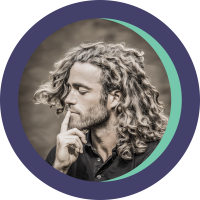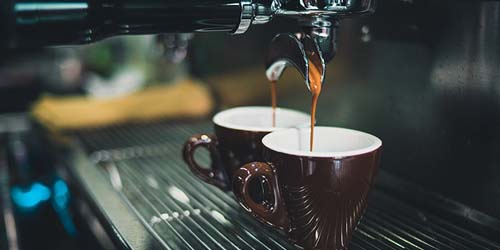
Drugs. What does that word even mean? If we look at the substances that change our behavior and our state of mind, they include more substances than, say, marijuana, ecstasy, ketamine and 2C-B. They are by no means all as taboo in our society. Perhaps caffeine is the greatest of the "normal drugs." It all starts with the plant itself. Coffee and tea plants have in fact developed something clever. By making a chemical compound, they can not only repel insects that want to eat the plant, but also attract insects that provide pollination. Bees are known to be attracted by that compound and keep coming back for more even after the plant has finished blooming. That addictive chemical compound is called 1,3,7-trimethylxanthine; better known as caffeine.
Some substances are considered so normal that we forget that they do affect your body, brain and life. In this blog series, we talk about the drugs we don't normally talk about and share what it's like to stop using these silent addictions for a while.
In this blog series:
- Soft drugs & Hard drugs
- Is Alcohol really that normal?
- Caffeine, the accepted liquid drug
- This is how Addiction & Dopamine works
The most normal drug in the world
It's not just insects that love caffeine. Coffee, tea and a handful of other plants that produce caffeine in seeds, leaves and flowers are among the most prosperous plant species. That's because humans have ensured that the plants are no longer just found in the tropics. Only cereals, corn and other edible grasses are more widespread across our planet than coffee and tea.
You could argue that our modern world runs on caffeine. A cup of coffee or tea provides an energy boost and extra alertness that we can use especially before we get to work. It is estimated that coffee is grown in more than 70 countries and is one of the most traded commodities. Only oil is traded more. Tea is the second most consumed beverage in the world after water.
For this reason, the use of caffeinated beverages is quite normal. Yet social acceptance does not make a drug more or less potent. Dose and drug are responsible for this.
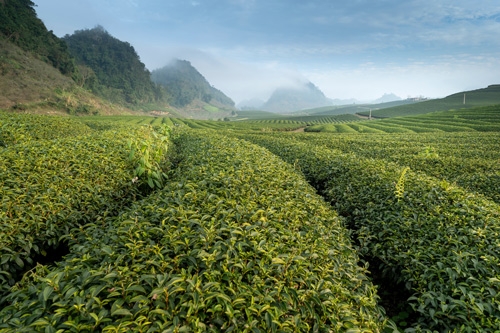
Endless tea fields in Asia.
Stop drinking coffee
At Dutch-Headshop, some of our team have experienced what it is like to quit drinking coffee. Especially the first day after quitting coffee cold turkey is intense. Depending on how many cups you usually drink, the headaches and concentration problems are not uncommon. It can take up to three days to recover, but up to a month (!) before you have the same energy coming out of you as you did when you knocked back a cup.
For most people it was surprising to see what caffeine does to you without you even realizing it. And that it is found in much more than you initially expect. Caffeine is in most hot drinks, with the exception of herbal teas. Also, chocolate and thus hot chocolate should be left out for a complete caffeine detox. As an alternative, you can have herbal tea. Something with ginger or lemon works well to give you an energy boost. Granted, totally not comparable to caffeine, but that's just the point. We are so used to being under the influence, that we have forgotten that we have that energy within ourselves.
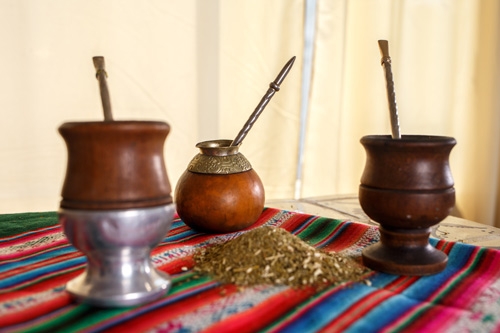
Yerba Maté, a South American hot drink with caffeine.
Start drinking coffee
By the way, the real shock doesn't come when you stop drinking coffee. It comes when you start using it again. After a month of being strict and taking absolutely no caffeine, it was time to have a cup of coffee again. Homemade filter coffee from the Dutch company Douwe Egberts; the retro stuff. Not long after drinking it, you immediately feel how potent this jet-black drink actually is. Your brain goes into overdrive. As if your thoughts go faster than the world. Think bullet time like in the cult movie The Matrix. It sounds like a hyperbole to say that a cup of coffee can completely change your perception, but it's not. Your heart rate speeds up, you become more alert and a little short-tempered. Depending on the person, you may feel top notch or just not yourself anymore. The true power of caffeine only comes out when you pour yourself a mug after a month.
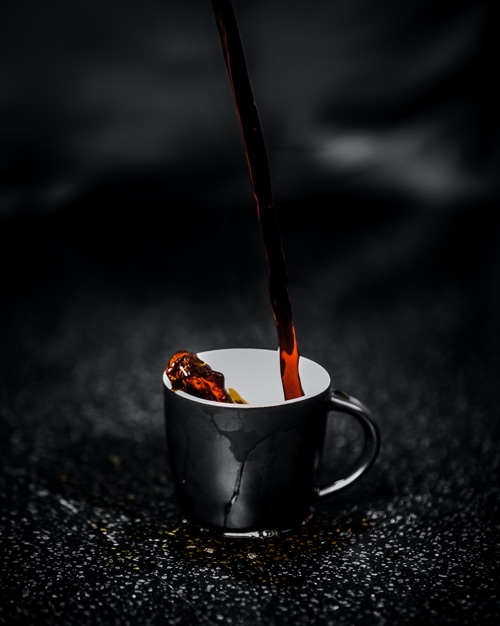
After a month without coffee, this can look very appetizing!
Caffeine in tea, theine, guaranine, etc.
Although caffeine has different origins, the biological effect of those varieties is exactly the same. So, theine from tea does the same to your body as caffeine from coffee and guaranine from guaraná; a popular ingredient in energy drinks. Caffeine is found in about 30 plant species. Some you may be familiar with. Others are more common in South American countries than in Europe:
- Coffee (Coffea arabica and Coffea canephora)
- Tea (Camellia sinensis)
- Cacao (Theobroma cacao)
- Guaraná (Paullinia cupana)
- Kola (Cola acuminata and Cola nitida)
- Yerba Maté (Ilex paraguariensis)
- Yaupon (Ilex vomitoria)
- Guayusa (Ilex guayusa)
The amount of caffeine varies greatly from drink to drink. The following chart shows how much caffeine a typical dose contains.
|
Cup of filter coffee (125 ml) |
88 mg |
|
Can of typical energy drink (250 ml) |
75 mg |
|
Cup of instant coffee (125 ml) |
63 mg |
|
Cup of yerba maté |
40 mg |
|
Cup of black tea (125 ml) |
38 mg |
|
Cup of green tea (125 ml) |
19 mg |
|
Glass of cola (180 ml) |
18 mg |
|
30 gr dark chocolate |
12 mg |
|
30 gr Milk chocolate |
6 mg |
|
Cup of decaf (caffeine "free" coffee, 125 ml) |
3 mg |
Why caffeine is a “Drug”
- It disrupts your natural sleep-wake rhythm
- Caffeine has a stimulating effect
- You build up a tolerance to caffeine
- Caffeine can be psychologically addictive
- You develop withdrawal symptoms if you stop abruptly
- Caffeine has more disadvantages than advantages at a dosage of 400-500 mg per day
Sleep-wake rhythm
Caffeine makes you less tired. But how exactly does that work? As long as you are awake, your body produces a neurotransmitter called adenosine. The bigger the pile of adenosine, the greater the need to go to sleep becomes. We also call this need the sleep pressure. When the pressure in the kettle increases, the only way to relieve the pressure is to sleep.
Caffeine binds to the same receptor as adenosine. That keeps adenosine from having a chance to bind. But as long as you're awake, the supply of adenosine only increases. Even when caffeine gets in the way. That process explains two things. As long as caffeine is on the receptor, you feel less of a need to sleep. And when the caffeine wears off, there's a mountain of adenosine waiting for you that is only too happy to bind to the released receptor. The result is that you suddenly become very tired. You crash.

Even when you are able to sleep, caffeine disrupts your sleep; you wake up less rested than without it.
Stimulating effect
Caffeine is a stimulant that has both psychological and physical effects. This is because it inhibits the action of the calming neurotransmitter GABA. Less GABA has an uplifting effect. It also releases extra acetylcholine; another neurotransmitter responsible for, among other things, increased focus. Furthermore, caffeine speeds up breathing, slows the heart rate and constricts blood vessels.
Caffeine increases alertness while counteracting fatigue and slack concentration. But it doesn't stop at improving cognitive functions. Both strength training and endurance training during exercise get a boost. Endurance and brute strength are even improved and you are less likely to suffer from muscle fatigue.

Caffeine tolerance
If you haven't ingested caffeine before or haven't for quite some time, you'll be struck by how much difficulty most people have with falling asleep.
There is significantly less dopamine released in certain parts of the brain in keen coffee drinkers. Dopamine, as we will explain in more detail in the last part of this series, is involved in the motivation to do something.
Addiction to coffee
Frequent caffeine use can lead to psychological dependence. When you see the effects of coffee or tea as a reward, you can become addicted to it. Even without you immediately realizing it. There is research that states there is no mechanism for caffeine addiction, but also that it can create a dependency through dopamine. Even when you experience adverse physical effects such as nervousness, a shorter temper or involuntary muscle twitching: a cup of coffee or tea can still be tempting.
Caffeine withdrawal symptoms
If you quit coffee or tea abruptly or cold-turkey, you can expect unpleasant withdrawal symptoms. How unpleasant caffeine withdrawal is depends on your daily intake. For example, if you normally drink only 1 cup of coffee in the morning to wake up, it's not so bad. But drink 3 or more cups in a day, and you may get a strong headache and concentration problems. You may feel down and lethargic and even start sweating.
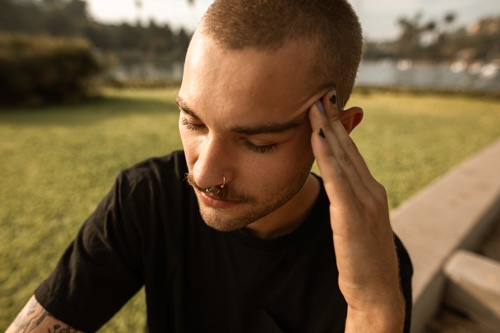
Caffeine Addiction Is Like Drug Addiction
A recent study showed that caffeine is an excellent substance to better understand the addictive effect of (other) drugs [1]. That's because we voluntarily take more caffeine to feel better. Especially when effects of withdrawal such as fatigue, headaches and concentration problems occur, we are more likely to reach for coffee. We simply feel better during a caffeine high and worse once the withdrawal symptoms set in. And that already happens with a daily intake of 100 mg per day, in other words 1 cup of filter coffee and a coke. Interestingly, the extra blood flow from caffeine is probably the major cause of withdrawal headaches. It is alarming that (young) adults who regularly drink caffeine test positive for the calibrated DSM-IV addiction test that is used to identify a drug addiction. According to this research, probably 9 to no less than 30% of all caffeine users are actually dependent on coffee, tea or energy drinks.
Adverse effects of high doses of caffeine
Everyone is different. Some people are very sensitive to a cup of coffee, while someone with a high natural tolerance can drink a lot and still not sleep any less. It has been scientifically established that the average person should not drink more than 400 to 500 mg of caffeine a day. That is 4 or 5 times a small cup (125 ml) of filter coffee or 2 large mugs. If you do this, your sleep will suffer greatly. Even when you have no trouble falling asleep. During the day you are less concentrated and less fit. This is because you still have a residual adenosine in your body that has not been cleared away by sleeping. So the sleeping pressure is not yet eliminated.
Caffeine Pills
Caffeine pills contain an extra high dose of caffeine. Sometimes up to 250 per pill. They have the advantage of being tasteless. That's useful if you don't like the bitter and sour taste of coffee or if you suffer from acid reflux. You will probably have to go to the toilet more often if you take one of these pills. Caffeine is diuretic. Make sure you drink some extra (water).
How Long Does Caffeine Last? How Long Does Caffeine Stay in Your Body?
The half-life is the time it takes a substance to be half as concentrated. Caffeine has a half-life of 3-7 hours in adults. This depends on a person's build, physical activity, intake of fluids and digestion (metabolism). This means that after consuming a cup of filter coffee (88 mg of caffeine) you will still have 44 mg in your system after 3-7 hours. After 6-14 hours it is still 22 mg. Only after about three days is it out of your system. But you are not yet free of the side effects or withdrawal symptoms. That can take up to 30 days.
In children, the half-life of caffeine is 8 hours. So it takes children longer to completely get rid of a cola. Therefore, it is advisable to give children no drinks or fewer drinks containing caffeine.
Pregnant women and women who want to become pregnant should watch out altogether. For the unborn child, the half-life is 100 hours (!). So it takes 100 hours for half a cup of coffee to be cleared from your baby's blood. So with repeated tea or coffee drinking, the stuff can build up in the fetus's body. It can become dangerous if you try to get pregnant and drink more than 300 mg of caffeine (2-3 cups of coffee or 4-5 cups of tea) per day. It is being suggested that this can lead to a higher risk of miscarriage.
The chart below shows what daily caffeine intake does to the amount of caffeine in your body if we assume an average half-life of 5 hours (adults).
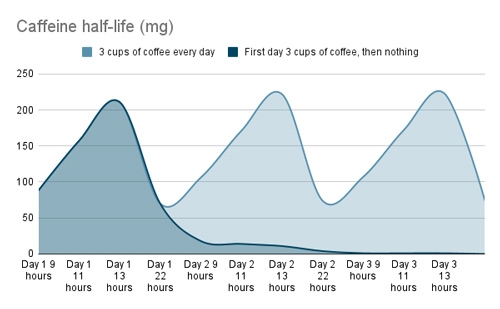
Light blue: suppose you drink your first cup of coffee at 9 o'clock in the morning. At 11 o'clock you want another one and after lunch at 1 o'clock you have your last cup. When you go to bed at 10 p.m., there is still 70 mg of caffeine in your blood. That's just a little less than 1 cup of coffee. If you repeat your coffee intake the next day, you will still have 74 mg in your blood at 10pm that night. This is because the amount from the day before has not yet been completely decomposed.
Dark blue: if you only take 3 cups of coffee on the first day and then no more, you'll see that it takes about 72 hours for it to be almost completely broken down. Even then, there is still caffeine in your blood when you go to bed. Still even on the second night.
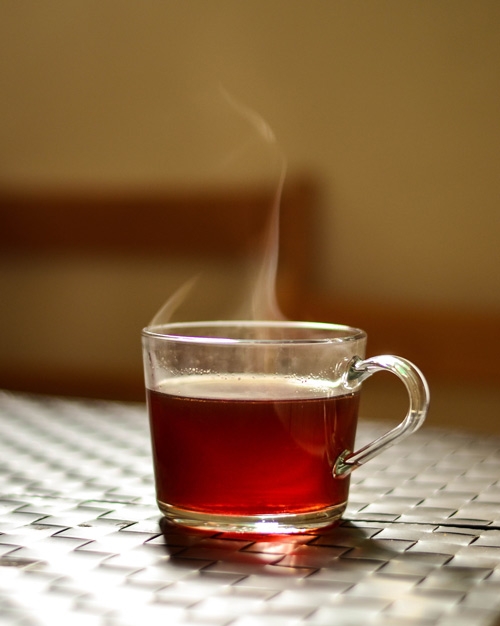
“A cup of comfort" or an addiction you don't want to admit to?
Caffeine and deep sleep
We spend our sleep in 4 phases. One of these phases, deep sleep, creates a harmony between different parts of the brain. As a result, the deep sleep clears away junk that does not belong there and the things you have learned and experienced in one day are 'written away' to the long-term memory. Deep sleep also has an important function for our long-term health. In the book "Why we Sleep" by sleep researcher Matt Walker, the author sums up all the well-done research. If we don't get enough deep sleep, it leads to increased risks of Alzheimer's disease, heart disease, depression, psychosis, obesity and other nasty predictions. Walker even sums it up as: less sleep = less life.
So quality of sleep is at least as important as quantity. If you can still have a cup of coffee at 10 p.m. and fall asleep just as quickly, it doesn't give you a license to do so. Research shows that you spend less time in deep sleep, with long term effects as described above.
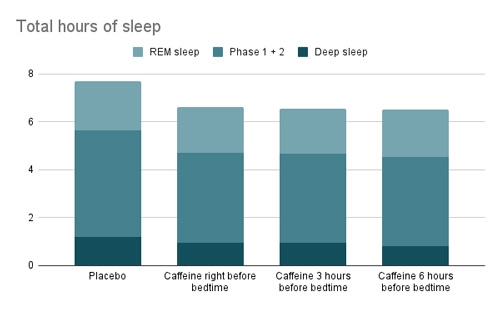
Although a cup of coffee or tea can bring some pretty positive effects such as a dose of antioxidants and, thanks to the caffeine, a temporary increased focus, it is important that caffeine is out of your body as much as possible before you go to sleep. Regardless of whether you are aware of sleep problems caused by this substance.
Caffeine Overdose
Although rare, in exceptional cases it is possible to die from a caffeine overdose. For example, in 2016 alone, 3702 caffeine poisonings were reported in the United States. Of those, 16 people ended up in a life-threatening situation. The fatal dose is 150 to 200 mg per kilogram of body weight, or 75 to 100 cups of coffee if you weigh 70 kg.
Did this blog just make you crave coffee more? How about instant coffee with cordyceps for exercise or Reishi Zen coffee for your health? Oh, and want to read more about all types of drugs? Then check out this list of drug types!
Next in the blog series: Dopamine - Social media, gaming, gambling and other addictions.
Sources:
- [1] Griffiths, R.R. Chausmer, A.L. “Caffeine as a model drug of dependence: recent developments in understanding caffeine withdrawal, the caffeine dependence syndrome, and caffeine negative reinforcement”. Japanese Journal of Psychopharmacology. November 2020. PMID: 11326548.
- Walker, M. “Why We Sleep”. ISBN: 9780141983769. Penguin Books Ltd. 2018.
- Pollan, M. “This is your Mind on Plants”. ISBN: 9780593296905. Penguin Putnam Inc. 2021.
- Huberman, A. “Master Your Sleep & Be More Alert When Awake“. The Huberman Lab Podcast #33
- Lassi, Z.S. et al. “Preconception care: caffeine, smoking, alcohol, drugs and other environmental chemical/radiation exposure”. doi: 10.1186/1742-4755-11-S3-S6. PMID: 25415846. Reproductive Health 26 sep. 2014.
- Drake C; Roehrs T; Shambroom J; Roth T. Caffeine effects on sleep taken 0, 3, or 6 hours before going to bed. J Clin Sleep Med 2013;9(11):1195-1200.
